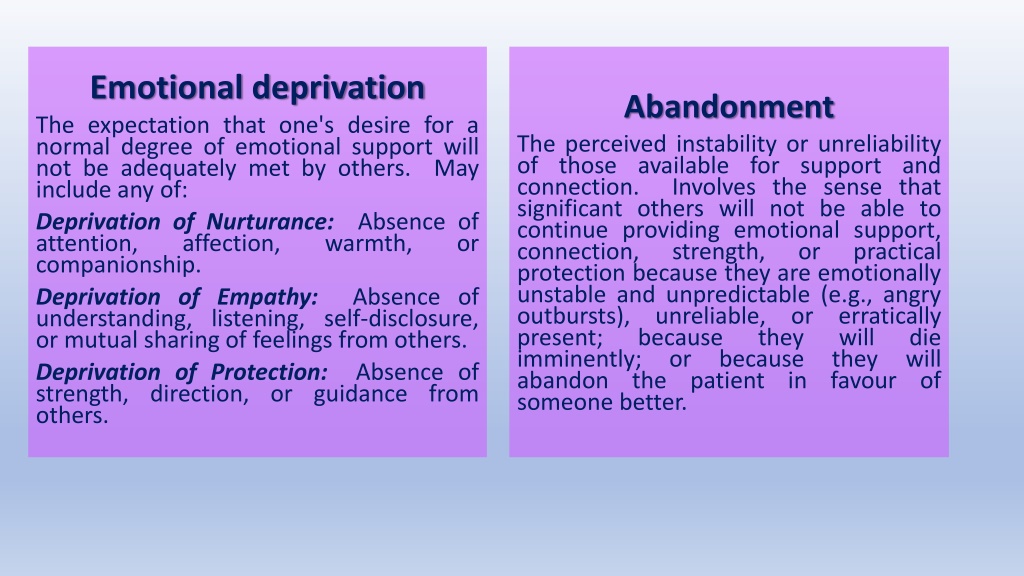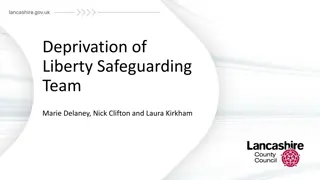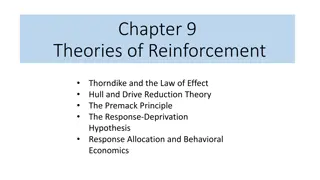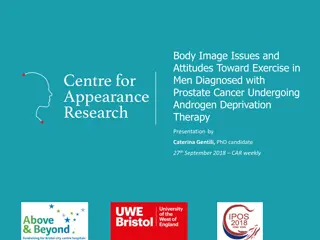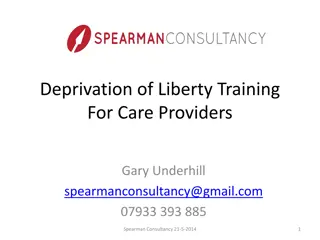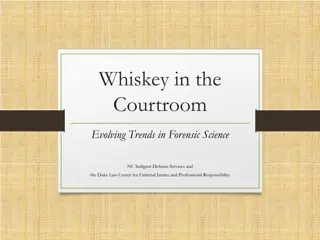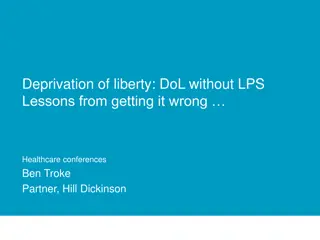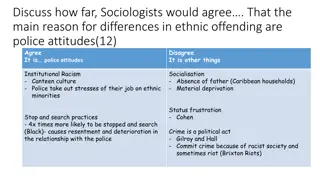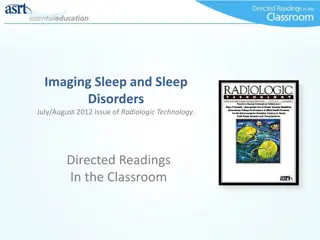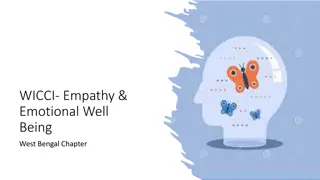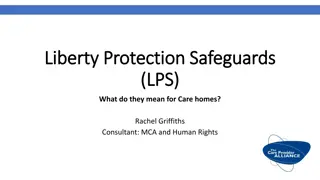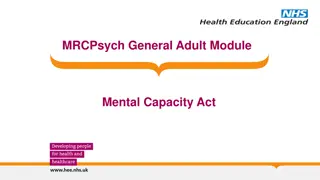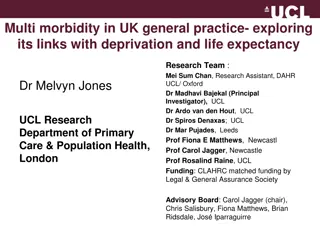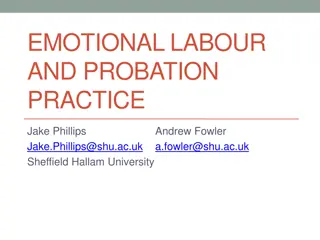Understanding Emotional Deprivation and Related Issues
Emotional deprivation encompasses the lack of emotional support, empathy, protection, and abandonment fears. Mistrust, social isolation, feelings of defectiveness and shame, vulnerability to harm, and self-sacrifice are also highlighted in the content.
Download Presentation

Please find below an Image/Link to download the presentation.
The content on the website is provided AS IS for your information and personal use only. It may not be sold, licensed, or shared on other websites without obtaining consent from the author. Download presentation by click this link. If you encounter any issues during the download, it is possible that the publisher has removed the file from their server.
E N D
Presentation Transcript
Emotional deprivation The expectation that one's desire for a normal degree of emotional support will not be adequately met by others. May include any of: Deprivation of Nurturance: attention, affection, companionship. Deprivation of Empathy: understanding, listening, self-disclosure, or mutual sharing of feelings from others. Deprivation of Protection: strength, direction, or guidance from others. Abandonment The perceived instability or unreliability of those available for support and connection. Involves the sense that significant others will not be able to continue providing emotional support, connection, strength, protection because they are emotionally unstable and unpredictable (e.g., angry outbursts), unreliable, or erratically present; because imminently; or because they will abandon the patient in favour of someone better. Absence of warmth, or or practical Absence of they will die Absence of
Mistrust/Abuse Social isolation / alienation The expectation that others will hurt, abuse, humiliate, cheat, lie, manipulate, or take advantage. Usually involves the perception that the harm is intentional or the result of unjustified negligence. May include the sense that one always ends up being cheated relative to others or "getting the short end of the stick." The feeling that one is isolated from the rest of the world, different from other people, and/or not part of any group or community. and extreme
Defectiveness / shame Failure The feeling that one is defective, bad, unwanted, inferior, or invalid in important respects; or that one would be unlovable to significant others if exposed. May involve hypersensitivity to criticism, rejection, and blame; self-consciousness, comparisons, and insecurity around others; or a sense of shame regarding one's perceived flaws. These flaws may selfishness, angry impulses, unacceptable sexual desires) or public (e.g., undesirable physical appearance, social awkwardness). The belief that one has failed, will inevitably fail, or is fundamentally inadequate relative to one's peers, in areas of achievement (school, career, sports, etc.). Often involves beliefs that one is stupid, inept, untalented, ignorant, lower successful than others, etc. be private (e.g., in status, less
Vulnerability to harm / illness Incompetence / dependence Exaggerated catastrophe will strike at any time and that one will be unable to prevent it. Fears focus on one or more of the following: Medical Catastrophes: e.g., heart attacks, AIDS; Emotional Catastrophes: e.g., going crazy; External Catastrophes: e.g., elevators collapsing, victimized airplane crashes, earthquakes. fear that imminent The belief that one is unable to handle one's responsibilities in a competent manner, without considerable help from others (e.g., take care of oneself, solve daily problems, exercise good judgment, tackle new tasks, make good decisions). Often presents as helplessness. everyday by criminals,
Self-sacrifice Subjugation Excessive focus on voluntarily meeting the needs of others in daily situations, at the expense of one's own gratification. The most common reasons are: to prevent causing pain to others; to avoid guilt from feeling selfish; or to maintain the connection with others perceived as needy. Often results from an acute sensitivity to the pain of others. Sometimes leads to a sense that one's own needs are not being adequately met and to resentment of those who are taken care of. (Overlaps with concept of co-dependency.) Surrenders control to others because feels coerced by fears of anger, retaliation, or abandonment. Perceives opinions, and feelings to be invalid or unimportant to others. Subjugation of needs: Suppression of one's preferences, decisions, and desires. Subjugation of emotions: Suppression of emotional expression, especially anger. Can result in excessive compliance, feeling trapped and a build up of anger, which manifests in e.g., temper outbursts , somatic symptoms, un-co-operativeness, withdraws affection. own desires,
Enmeshment Emotional inhibition Excessive closeness with one or more significant others (often parents), at the expense of full individuation or normal social development. Often involves the belief that at least one of the enmeshed individuals cannot survive or be happy without the constant support of the other. May also include feelings of being smothered by, or fused with, others or insufficient individual experienced as a feeling of emptiness and floundering, having no direction, or in extreme cases questioning one's existence. emotional involvement and The excessive inhibition of spontaneous action, feeling, or communication - usually to avoid disapproval by others, feelings of shame, or losing control of one s impulses. Most common areas are: Inhibition of anger & aggression; Inhibition of positive impulses (e.g., joy, affection, sexual excitement, play); Difficulty expressing vulnerability or freely communicating about one s feelings, needs, etc.; Excessive emphasis on rationality while disregarding emotions. identity. Often
Unrelenting standards Self-punitiveness Sets high internalized standards of behavior and performance, usually to avoid criticism. Results in feelings of pressure or difficulty slowing down, in hypercriticalness towards self and others, and marked impairment in: pleasure, relaxation, health, self-esteem, sense of accomplishment, or relationship satisfaction. Typically presents as: Perfectionism: inordinate attention to detail, or underestimating performance; Rigid rules and "shoulds" in many areas (e.g. unrealistically high moral, ethical, cultural, or religious precepts; or Preoccupation with time and efficiency, so that more can be accomplished. The belief that people should be harshly punished for making mistakes. Involves the tendency to be angry, intolerant, punitive, and impatient with those people (including oneself) who do not meet one's expectations or standards. Usually includes difficulty forgiving mistakes in oneself or others, because of a reluctance to consider extenuating circumstances, allow for human imperfection, or empathize with feelings. quality of own
Entitlement / superiority Feels superior to others, entitled to special rights / privileges, or not bound by the normal rules of social reciprocity. Insists on having or doing whatever s/he wants, regardless of what reasonable, or of the cost to others; or focuses excessively on success (e.g. achievement, fame, wealth) to achieve power or control (rather than attention / approval). Can competitiveness toward, or domination of, others: asserting one's power, forcing one's point of view, or controlling the behavior of others in line with one's own desires - without concern for others' needs or feelings. Admiration / recognition seeking Excessive emphasis approval, recognition, or attention from others, or fitting in, at the expense of developing a secure and true sense of self. Self-esteem is dependent primarily on the reactions of others rather than on one's own natural inclinations. Sometimes includes an overemphasis on status, appearance, social money, or achievement -- as means of gaining approval, attention (not primarily for power or control). Frequently results in major life decisions being inauthentic or unsatisfying; or in hypersensitivity to rejection. on gaining is realistic or include excessive acceptance, admiration, or
Insufficient self-control / self-discipline Pervasive difficulty or refusal to exercise sufficient self-control and frustration tolerance to achieve one's personal goals, or to restrain the excessive expression of one's emotions and impulses. In its milder form, patient presents exaggerated emphasis on discomfort- avoidance: avoiding pain, conflict, confrontation, responsibility, overexertion---at the expense of personal fulfillment, commitment, or integrity. Pessimism / worry A pervasive focus on negative aspects of life (pain, death, loss, disappointment, conflict, guilt, resentment, unsolved problems, potential mistakes, betrayal, things that could go wrong, etc.) while minimizing or neglecting aspects. An exaggerated expectation, in a wide range of contexts, that things will eventually go seriously wrong. An inordinate fear of making mistakes that might lead to: financial collapse, loss, humiliation, or being trapped in a bad situation. Frequently characterized by chronic worry, vigilance, complaining, or indecision. positive with an or
